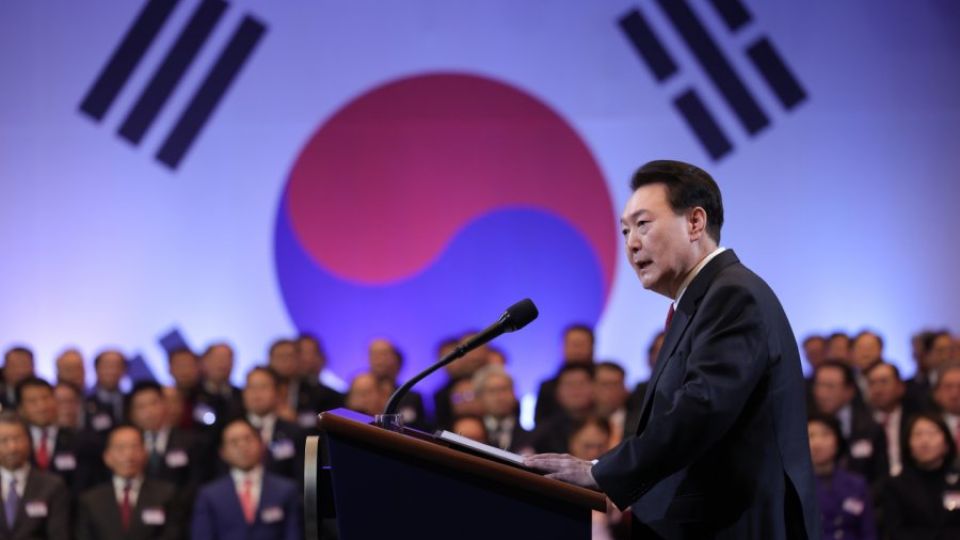January 3, 2024
SEOUL – President Yoon Suk Yeol on Tuesday proposed to withdraw South Korea’s plan to introduce a net investment income tax scheme beginning in 2025.
This came about a year after plans to impose the “financial investment income tax” on investors had been deferred for two years, meaning the new tax rule would go into effect in January next year. The rule, under the revision of the Income Tax Act, was initially passed in 2020 with bipartisan agreement.
“Our plan to introduce the financial investment income tax beginning next year will be repealed, for the sake of the long-term coexistence of people, investors and the stock market,” Yoon said at the Korea Exchange headquarters in Yeouido in Seoul, as stocks began trading at 10 a.m.
The scheme was designed for comprehensive taxation on a capital market investor’s annual net income from investment across a range of financial instruments, including shares, bonds, funds and derivatives, among others.
For those with net income of at least 50 million won ($38,400) from stock investments or 2.5 million won from other financial instruments except stocks in a year, a 22.5 percent income tax — national and local taxes combined — is to be imposed. The taxation rate goes up to 27.5 percent if net income exceeds 300 million won.
“If the excessive taxation on innocent investors does damage on them and disrupts the market, we should make changes to be in harmony with the market principles,” Yoon said.
This marks the first time Yoon has officially proposed to remove the scheme. First Vice Finance Minister Kim Byung-hwan told reporters Tuesday that the government has been in talks with Yoon’s office over the matter and is now collecting opinions to propose a revision to scrap the plans for the tax scheme.
This triggered criticism that Yoon’s proposal might favor the rich. Rep. Jang Hye-young of the minor opposition Justice Party said Yoon’s proposal would “take the country backward by giving up capital market soundness and undermining tax fairness.” According to the Korea Financial Investment Association’s estimate suggested by Jang, roughly 200,000 individuals have seen their net financial income from stock trades exceed the threshold of 50 million won from 2019 to 2021.
South Korea has some 14 million people who own at least one listed share, out of nearly 52 million population nationwide.
A short selling suspension has been in place since early November last year, and is poised to be effective through the first half of this year. The Yoon administration then cited concerns about market volatility and illegal short-selling practices that hamper price discovery on the stock market.
Since the short selling suspension — banning an investor from betting on the stock price downtrend — the main bourse Kospi climbed up 13 percent from Nov. 6 until Tuesday. The Korea Exchange is the only stock market operator of the country, and it runs bourses such as Kospi, Kosdaq and Konex.
Last month, the government also narrowed down those subject to capital gains tax, as the nation has imposed a tax on individuals holding a lump sum of shares of a certain company. Previously, those holding shares of a company worth 1 billion won were defined as “major shareholders” who are subject to such capital gains tax at the year-end, but the minimum threshold for the taxation rose to 5 billion won.
Later Tuesday, Yoon also hailed South Korea’s rebound in exports, as business circles here ring in 2024.
Exports were gaining momentum thanks to trailblazing efforts to enter overseas markets, jointly by government and business leaders, Yoon told some 400 entrepreneurs at the headquarters of the Korea Federation of SMEs in Yeouido, Seoul.
“Last year, the government and enterprises teamed up to reach out to overseas markets and sought a breakthrough to weather the economic crisis,” Yoon said. “As a result, we saw our exports rebounded. … In the new year, our economy is on the road to improvement, buttressed by the boost in exports.”
On Monday, South Korea’s Trade Ministry announced that South Korea’s monthly exports rose 5.1 percent on-year to $57.6 billion in December.
The fourth-largest economy of Asia suffered a slide in exports through 12 months until September last year, before turning around with a 5 percent on-year increase in October.
The momentum stems from the bullish trend in trades of semiconductor-related goods, which account for roughly 20 percent of the total exports by South Korea, showed the data. In December, the monthly semiconductor chip exports rose nearly 22 percent compared to the previous year, while November’s figure showed 13 percent increase on-year.
The same set of data also indicated that South Korea has recorded a trade surplus for seven straight months since June. Particularly in December, the monthly trade surplus of $4.48 billion marked the highest in three years, according to the government.
Regarding available jobs data, the monthly employment rate hovered over 63 percent from April until November, while the unemployment rate came just above 2 percent last year. Consumer inflation came to 3.6 percent in 2023, compared with 5.1 percent in 2022.


